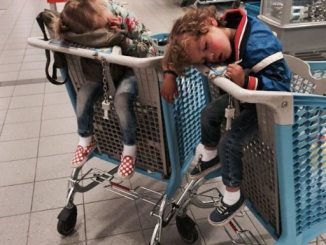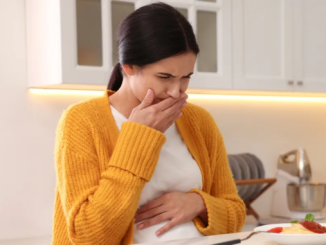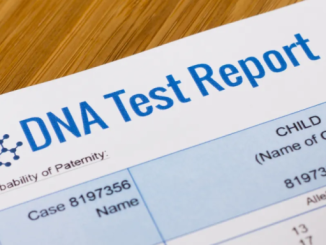
I thought it was motherhood. The kind of bone-deep exhaustion no one warns you about. Two kids, school drop-offs, late-night fevers, lunchboxes, bills—who isn’t breathless from that?
The chest tightness started in October. I blamed the weather. The swelling in my legs? Salt, probably. The dizziness? Low iron, again. I had an answer for everything. Except why I couldn’t walk up the stairs without gripping the railing like it was a cliff edge.
I kept saying, “I’m fine.” Because my daughter had a recital. Because my son still crawled into my bed every stormy night. Because I didn’t want them to see me hooked up to wires and tubes, looking like this.
It wasn’t until I collapsed in the kitchen—face still warm from yelling at them to brush their teeth—that I let someone call 911.
They ran tests. And more tests. And then came the words I still can’t process: “Your heart function is below 20%. We don’t know how you’re still standing.”
But after the shock wore off, I did what I always do. I made a list.
Cardiologist appointments. Medications. Diet changes. Arrange someone to take the kids to school. Try not to cry in front of them. Try not to look like I was dying, even though I kind of was.
My sister flew in from Kansas to help. She took over dinner duty and nagged me to rest. She meant well, but it just made me feel more useless. I missed packing their lunchboxes. I missed being needed. And the guilt? That never rested.
The doctor said my best chance was a transplant. That word hit me harder than the diagnosis itself. A transplant felt so final, so terrifying. Like I had crossed a line into a club I never asked to join. The one where you wait and hope and watch the phone like it’s a lottery machine.
The waiting list was long. My insurance was tricky. And I wasn’t getting better.
I remember sitting on the couch one morning, the kids already at school, and I could hear the tick of the clock louder than my own heartbeat. That scared me. It was like time was moving but I wasn’t.
I wanted to fight. Not for me, but for them. I hadn’t taught my daughter how to drive. I hadn’t helped my son with his science fair volcano yet. I wanted to be there for prom night, heartbreaks, silly fights, and Sunday pancakes. I wasn’t ready to go.
Then something unexpected happened.
A nurse at the hospital, Miriam, who had cared for me during one of my longer stays, took an interest in my case. She was gentle and kind and always made me feel human, not just like a diagnosis.
One night, when she brought my medication, she sat at the foot of my bed and said, “You remind me of my mom. She didn’t speak up either, not until it was too late. Don’t make the same mistake. Let people help you.”
I nodded, not really meaning it. But her words stuck.
A week later, Miriam came into my room smiling in a way that made me sit up straight.
“There’s someone I want you to meet,” she said.
A man stepped in. Gray beard, leather jacket, soft eyes. His name was Tom. Turned out, he was a transplant recipient too. Two years ago, he was where I was—scared, tired, and hanging by a thread.
We talked for over an hour. He told me how he used to work in construction, how he thought being strong meant ignoring pain. He lost consciousness at a job site, same as me in my kitchen. He said what saved him wasn’t just the surgery. It was surrendering. Letting go of the idea that he had to do everything alone.
After Tom left, I cried harder than I had in months. Not out of sadness, but out of some strange, cracked-open hope.
A week later, the call came.
They had a match. A donor heart. I should’ve been relieved, but I was terrified.
I sat the kids down that night. My daughter, always the brave one, took my hand and said, “Will you be okay, Mommy?” My son just stared at the floor.
“I’m going to try,” I said. And I meant it with every cell in my weak, failing body.
The surgery took hours. I don’t remember most of it. But when I woke up, I remember the light. It wasn’t even particularly bright, but it felt like the sun after a long, bitter winter.
Recovery was brutal. Stairs were mountains. Even brushing my hair left me breathless. But I was alive. And slowly, things started to come back.
My color. My appetite. My sense of humor.
The kids were cautious around me for a while, like I might shatter. But one night, my son climbed back into bed during a thunderstorm and whispered, “I missed this.”
Me too, buddy. Me too.
A month later, something strange happened.
I received a letter. No return address. Just a name: Maria. She was the mother of my heart donor.
She wrote that her son, Diego, had been twenty-six. A soccer player. A jokester. He’d died in a car accident. She said she prayed his heart would go to someone who’d use it well. She asked if I might write back someday, only if I wanted to.
I waited a week.
Then I wrote. I told her about my kids. About how Diego’s heart beats inside a tired but determined mom who now takes longer walks, laughs louder, and never misses another school recital. I sent a photo of the three of us at the park.
She replied.
We started exchanging letters. Then calls. Then, one day, Maria asked if she could meet me.
She flew in from Santa Fe, and we met at a quiet café by the hospital. When we hugged, it felt like a reunion more than a first meeting.
She placed her hand gently over my chest and said, “I feel him. Thank you for keeping him alive.”
I broke down right there. So did she. But it wasn’t sad. It was something else—something holy.
From that moment, Maria became family.
The kids call her Abuela Maria now. She visits twice a year and never forgets a birthday. She brings tamales and stories about Diego, who I now carry not just in my chest but in my life.
That December, I volunteered to speak at a transplant awareness event.
I told my story. People cried. So did I.
Afterward, a young woman came up to me and said, “You made me feel less alone. Thank you.”
And for the first time, I realized this wasn’t just about survival. It was about giving back.
I started a support group for women with heart conditions. We meet every second Thursday at the library. Some are newly diagnosed. Some are post-transplant. We laugh, cry, and share recipes and war stories.
One of them, Carla, told me she almost didn’t come. She was embarrassed. But now? She’s the loudest one in the room, always bringing snacks and hugs.
Funny how the heart—broken, borrowed, or brand new—can connect us like that.
These days, I still get tired. But it’s the good kind.
The kind that comes from bike rides, dance rehearsals, baking too many cupcakes for a bake sale.
Every night before bed, I press my hand to my chest. I thank Diego. I thank Maria. I thank my sister. And I thank the woman I used to be—the one who almost didn’t make it but found the courage to ask for help.
Life isn’t perfect. But it’s full.
And that’s more than I ever dreamed of when I was gripping the stair rail, pretending I was just tired.
Don’t wait until you collapse to admit you need help. Strength isn’t doing it all alone—it’s knowing when to lean on someone.
Also, never underestimate the power of second chances. Sometimes, the most broken pieces of your story become the ones that connect you to others.
If this story moved you in any way, take a moment to like it, share it with someone who needs hope, and maybe—just maybe—check on that strong friend who always says they’re “fine.”






Leave a Reply